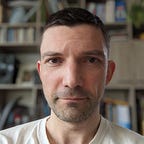Product engineer
In this post, I want to answer the following questions:
- What does product engineer mean? What is the difference from an engineer?
- Why should engineers and organisations care?
Just like there are organisations where it’s obvious what it means to be a product engineer and why most of the engineering consists of product engineers there are organisations where it is taken as a fuzzy and idealistic concept that does not work at all or does not work in the given organisation because they are special (uniqueness bias).
What is the difference?
In short, the difference is in the level of ownership.
The first level of ownership is taking responsibility for the code that I write. It’s about making sure that code is written following the best practices and that it works according to the spec.
The second level is being responsible not just for the code but resolving any organisational or other roadblocks that might appear on the path to production. This includes ensuring that it’s not just my code that works but that the whole feature works end-to-end according to the expectations.
The third level is where ownership of output shifts to ownership of the outcome. At this level, I don’t care merely about the spec but I care also about achieving the desired change in customer behavior — I want to see an outcome.
Why should I care?
In knowledge work, there is an inherent inefficiency that grows as the organisation grows. Therefore for an organisation to be successful it needs to be able to take full advantage of the intellectual potential of every each one of its employees.
This means having PMs who are not short for “project manager” but “product manager” (see this post about backlog manager vs product manager that explains the difference quite well). This means having engineers who are not just awesome at writing code but have a good understanding of the product context and care about not just technical quality but also the quality of the product (how well it solves the problem customers are having).
Being an engineer means constantly trying to keep up with all the new technologies and tools. However, not many products require hardcore engineering skills (especially from the start). The challenge is in building the right solution for the right problem. This is why investing in growing product skills even if you are an engineer pays off.
What does it look like in everyday life?
On one extreme we have an engineer who expects detailed ticket descriptions and feature specifications written by the product manager and the business analyst. Once coding is finished there would be a second handoff where QA starts testing the full feature (I have previously written on why QA and product engineering should be merged). Finally, we might have yet another handoff to “business testing” where the product manager and/or business analyst verifies that everything works as expected. Sometimes this kind of setup is rationalised saying that “it optimises engineering time”. Unfortunately, it’s only a local optimisation at best. This approach completely misses out on having high quality engineering input as part of the product trio.
On the other extreme, we might have someone like the Toyota chief engineer who is responsible for both the business and the engineering aspects of the product being built. This is the ultimate version of a product engineer. It is the most optimal in terms of handoffs. However, it is extremely rare to find people who will be able to fill such a multi-faceted role. By merging product management and engineering we also lose the creativity that comes from a healthy debate between these roles.
In the middle, we have a setup with a minimal number of handoffs and ceremonies where engineering is actively involved in product discovery and tracking/analysis of delivered impact. This way of working frees up precious product manager’s time from having to figure out all the solution details and doing everyday project management. Instead, the product manager can focus on product strategy and discovery wherein lies the main value of that role.
